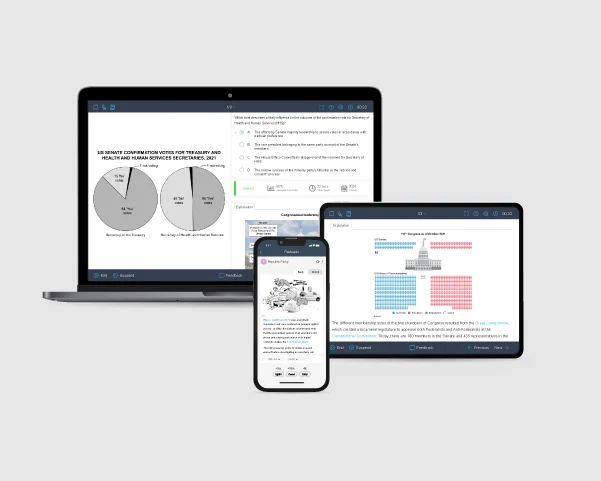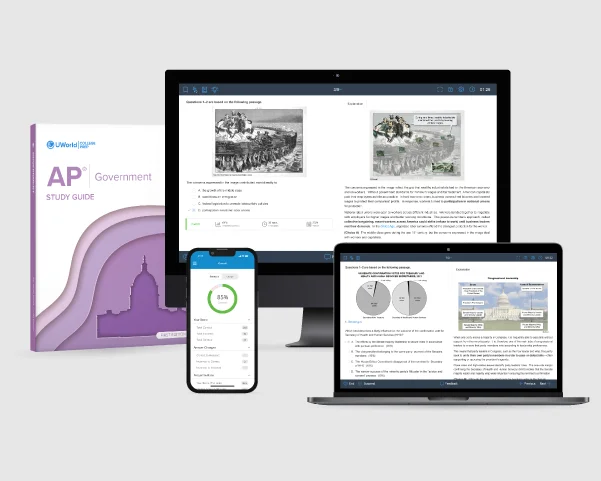Do you want to pursue a career in politics, law, or international relations? If so, opting to take the AP® United States Government and Politics exam in high school can help you do just that. This AP exam tests your knowledge of the United States’ political and constitutional system, preparing you for a successful career in law, government, and other related career paths.
But before we check out the exam and its course content, let’s dig into the prerequisites you should have for the AP U.S. Government course and address a few key questions to help you determine whether this course could be perfect for you.
AP U.S. Government and Politics: How Long Is It and Who Can Take It?
The College Board® categorizes AP U.S. Government and Politics as a one-semester social science course, although some schools offer it as a two-semester class. Since the number of semesters varies from campus to campus, make sure to check with your high school about whether AP U.S. Government is a half-year or a full-year course before taking it. Regardless, colleges typically consider it equivalent to a one-semester introductory government and politics course, and many even grant social science or elective class credits for a passing score on the AP Gov exam.
Students usually take AP Gov during their junior or senior year of high school.
There are no prerequisites for AP U.S. Government and Politics, and students don’t need to have prior knowledge of political science to take it. This is probably one of the reasons why AP Gov has become one of the most popular courses students choose each year. In 2024, alone, over 350,257 students took the AP U.S. Government exam.
The AP U.S. Government and Politics course provides you with a college-level introduction to key political concepts, ideas, institutions, and policies that characterize the constitutional system and political culture of the United States.
What’s on the AP U.S. Government Exam?
The AP U.S. Gov course framework that is tested on the exam consists of two essential components–course content and course skills. Knowing what to expect on the AP United States and Politics exam is the first step toward AP success, so let’s explore the content and skills it covers.
Course Content
The course’s content comprises five units and five key themes called "big ideas.” Let’s explore the course units and their weights on the AP U.S. Government exam’s multiple-choice section (MCQ).
| Units | Exam Weight |
|---|---|
| Unit 1: Foundations of American Democracy | 15 - 22% |
| Unit 2: Interactions Among Branches of Government | 25 - 36% |
| Unit 3: Civil Liberties and Civil Rights | 13 - 18% |
| Unit 4: American Political Ideologies and Beliefs | 10 - 15% |
| Unit 5: Political Participation | 20 -27% |
These 5 units simulate an introductory college course on the United States political system, institutions, constitutional policies, and actual trial cases and rulings. The course also covers 11 foundational documents, such as the U.S. Constitution and the Declaration of Independence, and 15 crucial Supreme Court cases. Together, these help you understand the U.S. political system's philosophical roots, critical legal precedents, and political ethics.
Strengthen your understanding of concepts with UWorld’s expertly designed AP U.S. Gov course and achieve your desired score.
Course Skills
Knowing the concepts and theories is not enough to succeed in this exam. You must also be able to assess a problem, analyze the data, and posit a claim using the tools and concepts you learned in your AP Government class. You’ll acquire these skills as you journey through the course content. These components are put in place by the College Board to help you assess and analyze data, evaluate and support your claim, and ace the AP U.S. Gov course with flying colors. Each exam question will require you to use these disciplinary practices and reasoning processes, so using these skills as often as possible is important. To learn about disciplinary practices, reasoning processes, and big ideas, check out our article on the AP United States Government and Politics course and exam description.
How Will the AP U.S. Government Exam be Scored and Formatted in 2025?
The AP U.S. Government and Politics exam features two sections: Section I comprises 55 multiple-choice questions (MCQs), and Section II includes four free-response questions (FRQs). The exam consists of similar question types, unit weights, and scoring parameters every year, so you know what to expect on exam day. Let's delve into a few questions below to familiarize ourselves with the AP U.S. Government exam format:
How long is the AP U.S. Government and Politics exam?
AP U.S. Gov is a three hour-long exam. The following table shows the exam format in detail:
| Section | Question Type | No. of Questions | Time per Section | Exam Weight |
|---|---|---|---|---|
| Section I | Multiple-Choice | 55 | 1 hr 20 mins | 50% |
| Section II | Free-Response | 4 | 1 hr 40 mins | 50% |
How many questions are on the AP U.S. Government exam?
There are 59 questions in the AP U.S. Government exam.
In Section I, you'll have to pick the correct answer from the four answer choices for each question. Because there are 55 questions to be answered in 1 hour and 20 minutes, try to complete this section within an hour. Doing so will give you 20 minutes to review your answers and/or address any questions you might have missed. You'll not be penalized for wrong answers in this section.
However, in Section II, you'll have to respond to four questions with written responses. These questions require you to assess the question, analyze data, and develop an argument in the form of an essay, supplementing your answer with evidence whenever needed. It is ideal to complete each question within 25 minutes.
How is the AP U.S. Government and Politics exam scored?
The AP U.S. Gov exam is scored on a scale of 1 to 5. Your final AP score will be recorded after your raw composite score is converted to the AP scaling system by the College Board. Each section carries 50% of the total exam weight, so scoring well in sections I and II will help you boost your final AP Gov score. Need more information on how this exam is scored? Check out our AP U.S. Government and Politics Scoring page to learn more.

Why Take AP U.S. Government and Politics?
Taking AP U.S. Government and Politics not only provides college credit opportunities, enhances critical thinking skills, and prepares students for informed citizenship but also fosters skill development, historical understanding, engagement in civic discourse, exposure to diverse perspectives, leadership development, and interdisciplinary connections. If you're looking for a social science class that opens doors to many sought-after majors, AP United States Government and Politics is your ticket. Nail that AP U.S. Gov exam and you'll be set for studying subjects like American studies, international relations, journalism, mass communication, law, and sociology.
AP U.S. Gov exam requires dedication and rigor to succeed. It all comes down to assessing the benefits and drawbacks to see if a subject fits you. Let's consider a few more reasons this course can improve your future career options.
-
Build a Solid Foundation in U.S. Political Studies for College
For students interested in political science, law, or related fields, AP U.S. Government provides a solid foundation of subject-specific knowledge and skills. AP U.S. Gov is no ordinary boring class. It contains more content than typical high school courses, pushing you to dive into research and flex those analytical muscles.
-
Improve Your College Applications
Want to showcase your college readiness and instantly boost your college application? Here's the deal: AP courses are like gold on a high school transcript. Since they follow a standardized curriculum, colleges know they can trust AP class credits. Passing the AP U.S. Gov exam also shows your academic prowess and proves you're ready to take on the challenge of college-level courses. Your chances of getting into your dream school are bound to increase as a result.
“85 percent of institutions say that a student's AP experience influences admission decisions positively.”1
-
Potential College Credit
While each college has its requirements, AP U.S. Gov is generally comparable to a first-semester college course in United States government and political studies. If your prospective college offers college credit for a passing score on AP exams, a score of 3 or above will usually qualify you for that benefit.
An AP score in AP U.S. Gov often fulfills the requirements for a history or social sciences major.
-
Boost Your High School Transcript
Many high schools weight AP courses higher than traditional high school courses on your GPA. As a result, receiving an average grade in an AP class is generally considered a better alternative than getting an A on a traditional high school course exam.
-
Save Time and Money
If you score well on the exam, you may be able to skip through introductory college courses related to AP Gov and enroll in advanced courses. This can help you save one year (25%) of college and one-fourth of your overall tuition fees.
“Studies show that students who achieve a 3 or better on AP exams have higher academic success and graduation rates than their non-AP classmates.”1
-
Broaden Your Career Options
Imagine this scenario: you start on the path of politics, but then a few semesters into college, you decide the law is your calling. No worries, AP U.S. Gov’s got you covered. It will keep your options open, no matter what you decide to do. With the AP U.S. Gov course in your arsenal, you can confidently explore different majors and keep your prospects open.
-
Build Critical Thinking And Writing Skills
AP U.S. Gov is about spotting cultural trends, placing solid arguments, and developing critical thinking skills. So if you want to level these skills up for a career in politics or related career paths, AP Gov is a great option. The ability to succinctly create an argument and support it with evidence will give you an edge over many of your peers in college..
(But wait, there's more!) This course plays well with others. Consider teaming it up with AP U.S. History, AP World History, or AP Comparative Government and Politics. These power combos give you everything you need to know about the U.S. political system, its roots, and the documents that shaped it. You'll become proficient in understanding why certain decisions were made and how they fit into the bigger picture of what was going on at home and worldwide. These reasons–and several others–might explain AP Gov’s popularity among students. In 2024, alone, over 350,000 students took the course, and a solid 73% of them earned scores of 3 or higher.
Let’s check out a few questions that explore how the AP U.S. Gov course and exam can boost your career and college prospects:
How many college credits do you get with a score of 3, 4, or 5 on the AP U.S. Government exam?
Generally, a score of 3 is considered passing, and many institutions may award you college credit for it. A passing AP U.S. Gov score typically fulfills prerequisites for a history or social science college course and earns around 3 college credits for passing the AP exam.
However, the amount of credit and the specific course it satisfies can vary institution to institution. The best way to know the credit policies for a specific college is to check with the college's admissions or registrar's office, or consult their official AP credit policy.
Does AP U.S. Government look good on a college application?
Yes, completing AP U.S. Government and Politics can positively impact your college application. Completing AP U.S. Government and Politics enhances a college application by demonstrating academic rigor, showcasing subject-specific knowledge, and indicating readiness for college-level work.
Is AP U.S. Government worth taking? Yes, we think so! It can be valuable for earning college credit, developing critical thinking skills, preparing for civic engagement, and standing out in college admissions.
Should I Take AP U.S. Government?
If you are still unsure if AP U.S. Gov could be the right fit for you, ask yourself:
-
What are your future goals?
Are you interested in pursuing a career in political sciences, legislation, or something similar? AP U.S. Gov is a versatile course for international relations, journalism, and legal and paralegal studies students. It is also an option if you wish to fulfill a course requirement for your college major.
Understanding your career ambitions and aptitude is important to deciding whether a course like AP U.S. Government and Politics could benefit you in the long run.
-
Are you skilled at reading, analyzing, and interpreting data?
The AP U.S. Gov course emphasizes analyzing information over rote memorization. However, since a big chunk of this course is based on foundational documents, it also requires skills. You will likely excel in this course if you possess excellent analytic, organizational, critical thinking, and memorization skills.
-
How many other AP classes are you taking? How rigorous are they?
As an AP course, AP U.S. Government and Politics requires its due diligence, planning, and effort to secure a good AP score. Sometimes, students overburden themselves by enrolling in several AP classes, then burn out before the end of the semester. It is always better to take a few courses you know you can confidently handle than it is to take many courses and falter midway. It’s important to ask yourself if it’s realistic to add another AP class and still succeed without burning out. The number of AP courses a student can feasibly take on is different for everyone, so it’s important to make this decision based on what’s right for you.
Is AP U.S. Government and Politics Difficult?
Scoring a 3 or higher on the AP U.S. Government exam has historically been a challenge for students. In 2022, only 48.7% achieved this benchmark, and in 2023, the number rose slightly to 49.2%. However, the 2024 exam saw a significant jump, with 73% of students earning a score of 3 or higher. This improvement could be attributed to the course's unique demands—it requires students to analyze, recall complex information, and write effectively, skills that take time and practice to master.
To maximize your preparation, UWorld offers a comprehensive AP U.S. Government study guide and an extensive QBank designed to help you understand key concepts and excel on the exam.
AP U.S. Government Review Tips
Preparing for a heavyweight course like AP U.S. Gov requires meticulous planning, preparation, time, and dedication, which can sometimes feel tricky. Not to worry, however, because a few simple tips can help you easily review the course material.
-
Prepare a study schedule well ahead of time
Students preparing for AP exams often fail to plan a detailed study schedule ahead of time, preventing them from engaging with the subject systematically. Planning a study schedule will help you break the course content into smaller, manageable chunks and will also help you identify the difficult portions of each unit. You can revise and work on these portions as you proceed through the course.
-
Make study notes on the side
Remember to always make study notes while preparing for your exam. If you are following a regular study schedule, you’ll already have the course broken down into bite-sized chunks. While focusing on each unit, note down the tricky topics so you can follow up on them during your review. Take notes while studying for each of your politics or government courses–these notes will come in handy and serve as a foundation for your AP notes later.
-
Familiarize yourself with the question format through practice tests
You can choose from various practice tests, like UWorld's AP U.S. Government and Politics QBank. As you practice more, you will become familiar with what the questions are asking of you and the various ways to approach and analyze a question. Since this course requires argumentative essay-type questions, practice tests boost your knowledge of the subject so you can draft your essays quickly.
While studying for an AP exam with reference books can help, it’s ideal to actually enroll in AP classes, either online or in-person, where you clear up any misconceptions with the help of an AP teacher for an efficient learning process. Our step-by-step AP U.S. Government and Politics Study Plan can also help. We work hard for you so you can prep faster and smarter. The best part? We offer a free trial!

Frequently Asked Questions (FAQs)
When is the AP U.S. Government and Politics 2025 exam?
The AP U.S. Government and Politics 2025 exam is scheduled for Tuesday, May 6, at 12:00 p.m. local time.
What to bring to the AP U.S. Government exam
- A watch.
- A school-issued or government-issued photo ID (required if testing at a school other than your own).
- A fully charged device and its power cord.
- College Board account login details.
- Pens or pencils for writing on scratch paper provided by the school.
- Optional: An external mouse.
- External keyboard requirements: Must be used if testing on a tablet or iPad. Not allowed for students using a laptop.
Where can I find past AP U.S. Government exam questions?
For AP U.S. Government past exam questions, you can visit AP U.S. Government and Politics: Past Exam Questions – AP Central on the official College Board website.
When do students usually take AP U.S. Government?
Students typically take the AP U.S. Gov exam in their junior or senior years of high school. AP exams are always in May.
How much does the AP U.S. Government exam cost?
The AP U.S. Government exam costs $99 for students in the U.S., Canada, and U.S. territories and $129 if you are an international student. Check out our article on AP Exam Eligibility, Registration & Cost to learn more about AP exam costs, late-testing fees, and other additional fees or rebates you can get for AP Exams.
References
- Benefits of AP – AP Central | College Board. (2024). Apcentral.collegeboard.org. Retrieved December 16, 2024, from https://apcentral.collegeboard.org/about-ap/ap-a-glance/discover-benefits#footnote-2-origin
- (2024). AP United States Government and Politics. College Board. Retrieved December 16, 2024, from https://apstudents.collegeboard.org/courses/ap-united-states-government-and-politics
- (2023, Fall). AP United States Government and Politics Course and Exam Description. College Board. Retrieved December 16, 2024, from https://apcentral.collegeboard.org/media/pdf/ap-us-government-and-politics-course-and-exam-description.pdf
- (2024). AP Score Distributions. College Board. Retrieved December 16, 2024, from https://apstudents.collegeboard.org/about-ap-scores/score-distributions
- (2024). 2025 AP Exam Dates. College Board. Retrieved December 16, 2024, from https://apcentral.collegeboard.org/exam-administration-ordering-scores/exam-dates#:~:text=The%202025%20AP%20Exams%20will,to%20report%20for%20the%20exams.
- (2025). What Students Should and Should Not Bring. College Board. Retrieved December 16, 2024, from https://apcentral.collegeboard.org/exam-administration-ordering-scores/administering-exams/preparing-for-exam-day/what-students-can-cannot-bring
Read More About the AP U.S. Government & Politics Exam
Want to know the format of the AP U.S. Government and Politics Exam? This article explains how the AP Government exam is set up, including the sections, question types, and much more.
AP U.S. Government and Politics CEDIt takes a long time to go through the entire CED PDF. Use this AP U.S. Government Course and Exam Description to learn everything you need to know about the exam, units, and topics!
AP U.S. Government and Politics ScoringCrunch some numbers with our AP U.S. Government Scoring Guide—including detailed score distribution, crucial information on rubrics, and a test score calculator to easily project your score.
AP U.S. Government and Politics Study GuideYour dream school needs a dream score! We can help you reach your goal—find our AP U.S. Government and PoliticsStudy Guide for all the tips, tricks, and important materials you need to get a 5.
Best AP U.S. Government and Politics Study Guide ComparisonExplore top AP U.S. Government study guides to find the best resources for the exam. Compare features, pros, cons and reviews to select the perfect guide for success.
Best AP U.S. Government and Politics Prep Course ReviewDiscover the best AP U.S. Government prep courses available. Compare key features, pricings, reviews, and benefits to select the course that best fits your learning.




